The route for the 2020 Critérium du Dauphiné race (31 May- 7 June) has been unveiled today and for only the second time in the race’s history there’s no time trial. Instead it’s a race of two halves with a flatter first part before four consecutive stages in the Alps with beaucoup climbing. Often a highlight of the year, the route borrows from this summer Tour de France but there are also some “new” climbs.
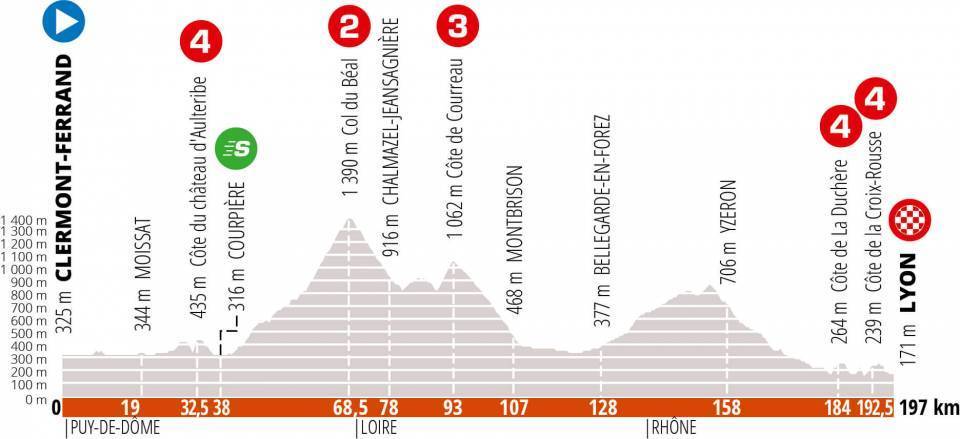
Stage 1 is interesting as it links two large cities, notably for what is otherwise a rural sport. It’s via the large Col du Béal, once a summit finish scene of a duel between Alberto Contador and Chris Froome. It’s also a copy of Stage 14 of the Tour de France including the two sharp climbs in Lyon before the finish.
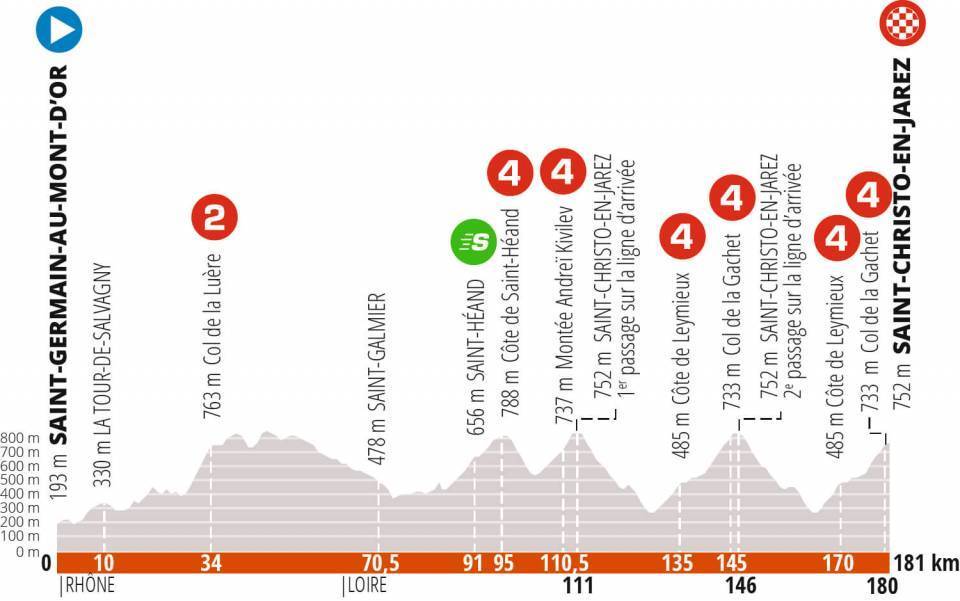
Stage 2 sees the race loop around the scenic monts du lyonnais with a finishing circuit. None of the climbs are hard, they’re typically big ring 4-5% efforts but enough to shed bulkier sprinters.
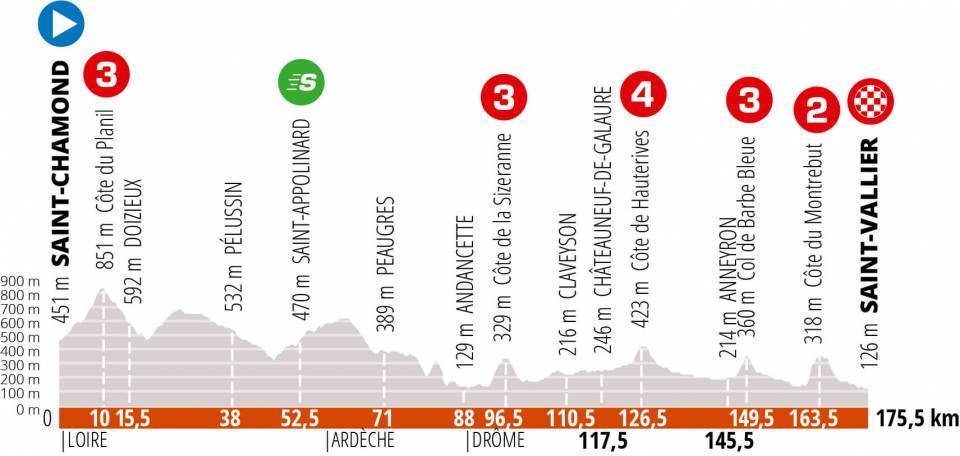
Stage 3 and it’s still awkward for the sprinters with the climb of Montrebut late in the race, a steep “wall” climb of 12% above the Rhone valley.
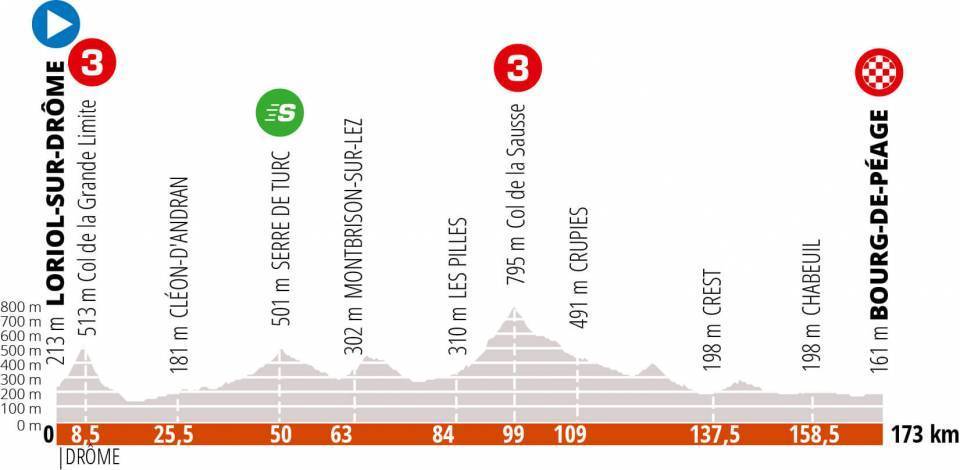
Stage 4 is the reward for the sprinters who have decided to start the race with a flat finish in Bourg.
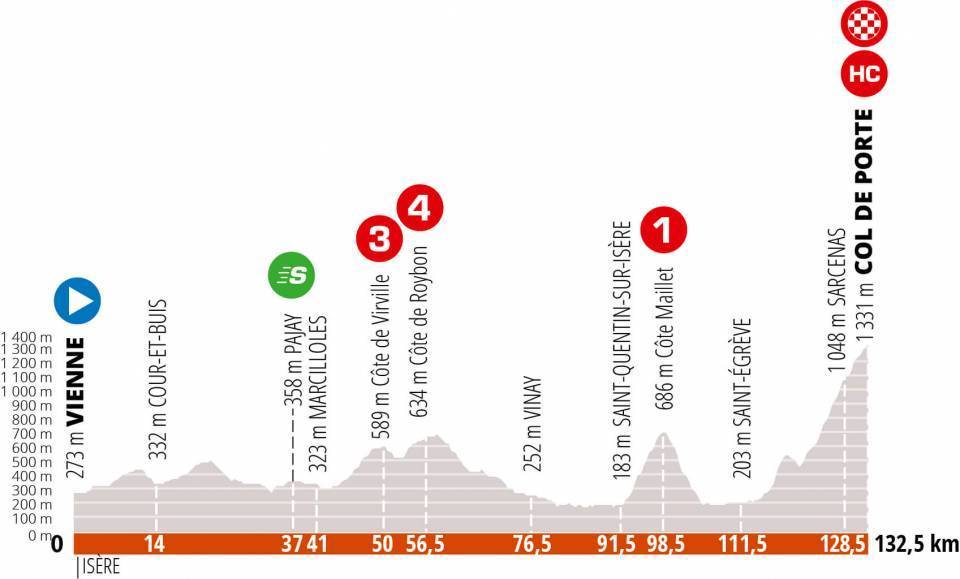
Stage 5 is dominated by the Col de Porte “summit” finish as the race climbs into the Charteuse massif. The Col de Porte isn’t a hard climb but look closely at the profile and you can spot a descent. They’re going up via the Col de Palaquit which has early ramps of 10-12% and an irregular feel and was used in the 2014 Tour de France. After Sarcenas they join the main road and it’s a regular ascent to the pass.
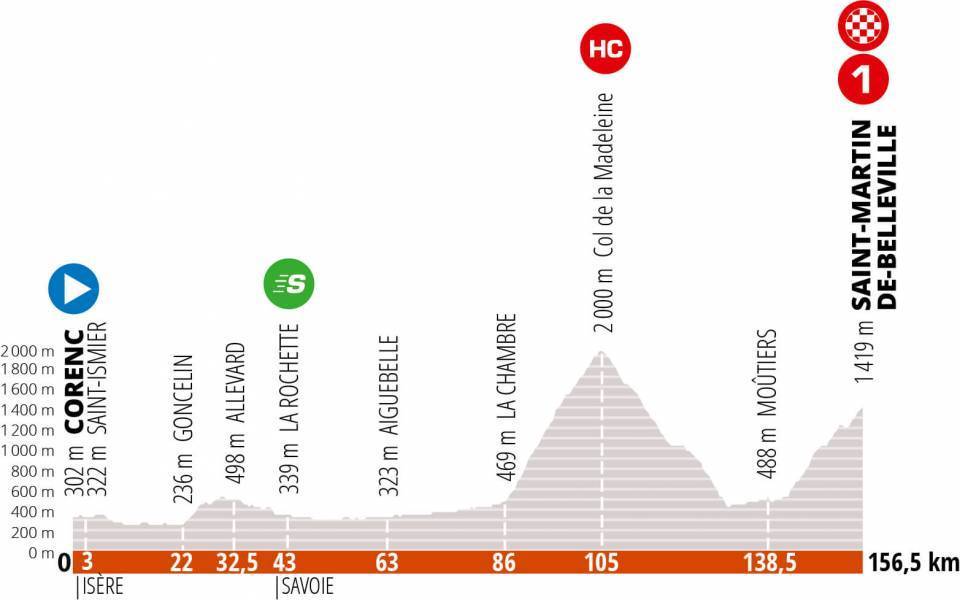
Stage 6 features the mighty Col de la Madeleine and is climbed via the same smaller side route this summer’s Tour de France will use before reaching the pass which as any Alpine pedant should know, is a few metres short of 2,000m above sea level despite the signs. A descent to Moûtiers and then the climb to Saint-Martin-de-Belleville, better known as the road to Val Thorens and the same steep backroad via Planvillard that the Tour de France tackled on its final mountain stage last summer. That day proved an anti-climax but the section to St. Martin was the most selective and dynamic part of the day.
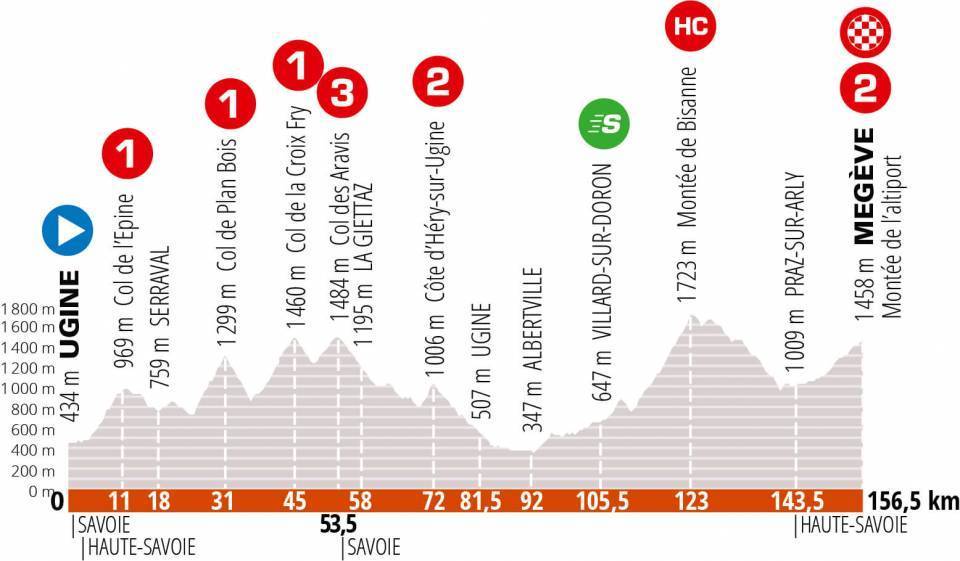
Stage 7 and it’s uphill from the start via the thorny Col de l’Epine and then the Col de Plan Bois which is both scenic and nasty, a place to enjoy the views if you can lift your head up on the steep slopes and possibly never used in a race until now. Then it’s onto more classic climbs like the Croix-Fry and Aravis before a mid-stage section that’s relatively flat ending with the steep Montée de Bisanne and then the climb to the Megève’s mini airport, a backroad but for the most part a gentle 4%.
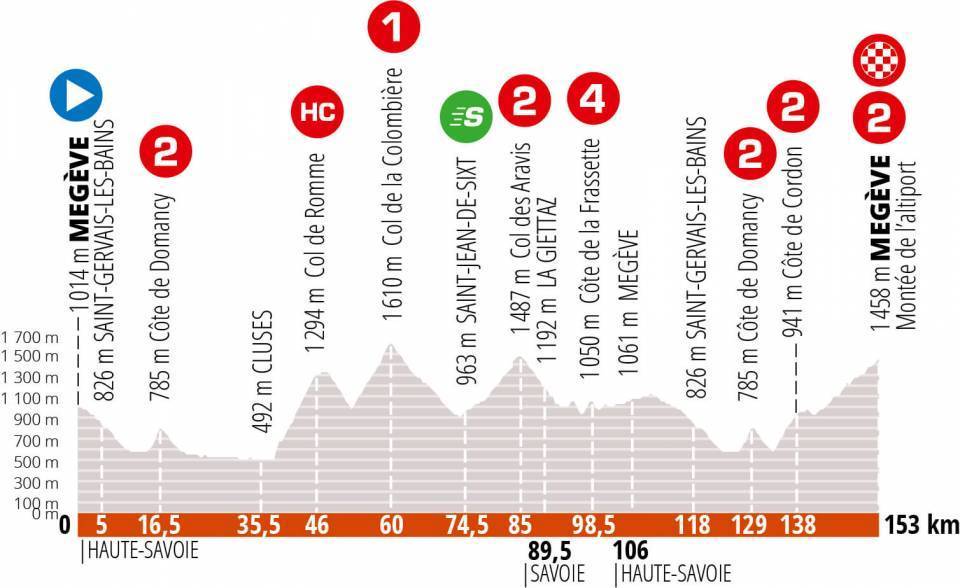
Stage 8 and the same finish as the previous day but a more intense route. It’s a loop around Megève with the Romme-Colombière combo and then the Aravis to return to Megève before a small loop via the two climbs of Domancy – famous as the circuit for the Worlds once – and Cordon, a new scenic side road, before the same road to the airport.
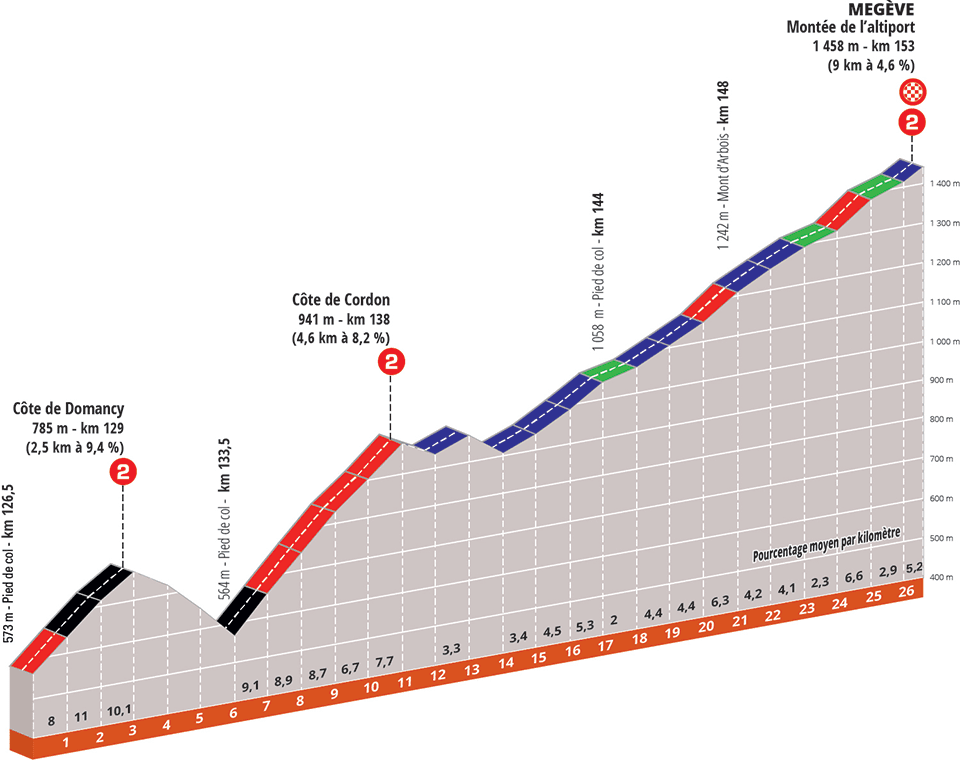
The Verdict: there’s no time trial, apparently the only other time this happened was the first edition of the race in 1947. The first four stages are for versatile sprinters and punchy riders and then the final four are for the climbers and GC contenders. There was talk of including the Col de la Loze as a dress rehearsal in the local press but roadworks in the area during June means the ski resort of Megève has snapped up the whole final weekend. On paper the first two summit finishes look like standard fare but they’re harder than they look because they take back roads to make things steeper and more irregular. The final weekend’s stages are packed with the climbing but the risk is the repeat of the same relatively gentle final climb keeps a lid on things, teams with strong mountain trains can control the race here but those wanting to avoid this scenario can exploit the short distances and lively climbs. It’s much hillier and harder than last year’s race which fell a bit flat.

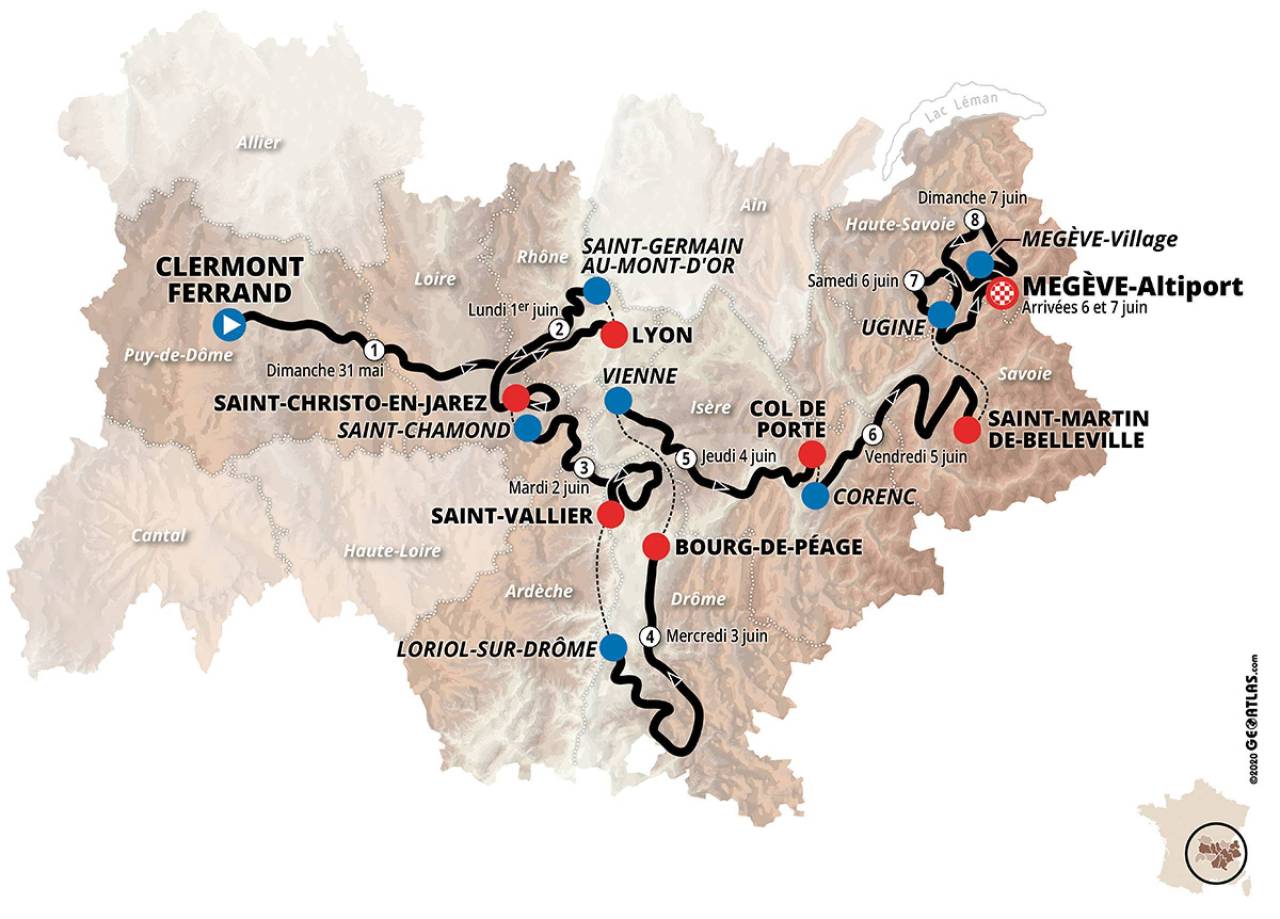
This looks like an exciting race.
It’s usually good. The only worry is the TV coverage starts late, the last 60-90 minutes because of competition with Rolland Garros tennis so we could miss some of the best climbs.
We stayed in a holiday vacation one summer halfway up the Col de Plan Bois. Great cycling territory with the Aravis, Colombiere, Croix-fry and Lake Annecy on the doorstep, but you can’t imagine how painful it was to get to the bottom of the Plan Bois at the end of a big day in the hill, with half the climb ahead to get home!
Lots of great roads around as you say… but Plan Bois has 12% slopes, a hard end to the day.
It seems slightly surprising that there’s no TT given that this race could be a curtain raiser to the great Jumbo-Visma / Ineos GC showdown and plenty of the main men may well be in attendance too?
A bit early to talk up that particular rivalry, lets see who actually makes the start line first. However do agree that no TT is somewhat odd.
I’ve answered my own question below, really 😀
But Froome is usually present at the Dauphine, perhaps one of Bernal or Thomas too, and almost certainly either Dumoulin or Roglic?
So a TT run-off would have plenty of interest for race followers, though not so for the wider audience maybe.
They might also be trying to compensate for last year’s race, where the TT was hugely important. Only the stage finish to Les Sept-Laux (under a deluge) was selective enough, and most of the differences were actually made on the rather long TT around Roanne.
At a time when the Tour de Suisse organizers seem to rediscover that there are mountains around Switzerland, it’s important for the Dauphine to offer a good climbing playground.
I think that’s the idea, the thinking apparently is that the TT last year dominated the final outcome… but I think the mountain stages were not as good in their design either, Les Sept Laux was a long steady climb.
its a dauphine to mirror the tour as is often the case – minimal TT kms in le tour scales down to none in the dauphine.
i quite like that in some respects as giving a whole day of a week long race over to a normally short TT often seems like a lull in the action but the GC influence can be interesting
I’m not convinced that the non-TT is a case of mimicking the Tour, more a case of getting rid of a ratings loser that doesn’t really sell the scenery in a way that a full day in the mountains can?
I’d concur with this.
I would view it as a positive that at least one race organiser is starting to think about how the sport is presented to the public, an area where cycling is stagnating while other sports are moving forward.
It’s amazing from a British perspective that Stages 1-4 are for the sprinters yet they all go over climbs which are higher than the highest paved public road in Britain.
IMHO sprinters rarely get the respect they deserve. Too many punters describe them as wheel-suckers who just make a big effort at the end of the race. Is that because those punters don’t watch any more of the race than the final sprint to the line? The sprinters might be “in the bus” on the big climbs but they’re still going up at speeds the punters can only dream of.
Yeah, agreed, plus they’re often taking it as easy as they can to preserve energy for future stages.
This race is in line with the trend to eliminate TTs and pack the route with hilly days. I would like to see a split stage day thrown in the mix. One day, two stages, with a TT followed by a Sprint stage. This could be all done on a city circuit. Such a format would preserve the TT as a necessary ingredient for a stage racer and would give sprinters a chance for victory. The split stage circuit format creates an on-the-ground spectator experience as well as a made for TV package. The TT could be broadcast in a highlights format as a prelude to the circuit race.
The riders won’t be voting for you to run their union! Those kind of days were one of the things they seemed to hate most back-in-the-day with strikes and go-slows the result more than once. But perhaps if Velon proposed it?
The riders re-elected a president who doesn’t work in their interests just last year, so I don’t see why they couldn’t continue Bugno’s tradition with Mr Burkett 😉
I reckon they would be open to a half-stage format where riders would be required to ride only one of the time trial or the circuit race (but permitted to do both if they want to). This would be ideal for the final day of a tour, with the top 10 (plus any other riders who think they could move up into the top 10 or want to contest for the TT win) being required to race the TT and the GC frozen for everyone else.
In the circuit race, you would have lots of intermediate sprints and double points on the finish to provide a grand occasion for the sprinters, and no GC timing so long as riders entered finish without losing a lap.
It would be worth trialling it in a lower level WT stage race before permitting it in the bigger ones.
Perhaps it’s just me, but does pro cycling really need this kind of gimmicky stuff? Complicated and confusing schemes like yours are going to bring in zillions of new fans? It’s hard for me to see riders suddenly being for days with more than one race when they protested so forcefully against the idea in the past, but perhaps when DaveRides is the new president of the riders union it’ll happen, as he certainly knows more about what’ll work than some clown named Gianni Bugno 🙂
I don’t think you are talking crazy. I don’t think a split stage/2-4-1 scenario would go down well with the racers.
Also, while such stages (looped stages in a confined locale) are great for the local economy and spectators, their no so good for TV, and that’s where the money is. For one, you’d need to either have two shows for live streaming, or one, with the preceding event being shown on replay before the second event is shown live.
I know it’s not popular, but I do think a TT is good. It’s a skill to be a good TTer, but I also think it makes riders be more than just a one trick pony. It also agitates the race a bit. If there are no time gaps the mountain climbers just watch each other. If the TT has caused a shake down you’re more likely to see a contender make a tilt further out to get bigger time gaps.
RQS- While I find ITT’s rather dull to watch, if a stage race’ goal is to reveal the best all-round rider, leaving ’em out seems to defeat the purpose. OTOH, in some ways I like the TTT since it can require a team decide on “horses for courses” – pack your squad with mountain men to help your GC guy or risk leaving a few of those out to have some big engines to drag him along in that TTT. Anything to make stage racing less formulaic would be good IMHO.
Yeah. Well the issue is that teams develop tactics and rosters to deal with formulaic stuff don’t they?! I guess you have to try something radical if you want to mix it up. But there’s something in the country/terrain which favours certain sorts of riders which is hard to escape. The same sorts of riders don’t seem to win the Vuelta and the Tour, or the Giro and the Vuelta, or the Giro and the Tour, Froome being the notable exception in recent history.
The question is what tweak can be made. Perhaps the answer is even smaller teams. Make it hard for any single team to control the race. But as we see with eight man teams and the WCs that can make things even less dynamic with no one willing to burn their domestiques for stage dominance.
Of course there have been Tours designed to particular rider strengths. Prud’homme pretty much stuffed as many mountain top finishes in for the Schleck brothers only for them to stuff it up (coincidentally in a penultimate TT stage). Though where Andy lost it was when he bottled it a wet downhill to gift the Tour to cuddles. It was rather telling that he complained that he didn’t really think that descending was a proper part of racing – though in light of Wouter Weylandt’s crash you can appreciate his hesitancy.
RQS- I probably should not have written “ANYTHING” to make a stage race less formulaic since that opens the door to all kinds of goofy suggestions. But as dull as I find the ITT and while plenty of others seem to detest TTT’s I think both should be included as what works for those stages is often different than what works elsewhere. The tired, dull (but sadly, hugely successful, so how can you blame ’em?) formula burned in my memory by BigTex and Co and copied by SKY/INEOS – buy up all the potential challengers you can afford and line ’em up in service of your leader on the big climbs – scheme too often suffocates a three week race, so throwing in some unpaved sections or anything requiring skill/bike handling is a plus for exactly the reasons the likes of Mr. Schleck hated the idea. Too many races devolve into simple watts/kilogram exercises these days.
Finally I’d add that a certain Vincenzo Nibali is also a notable exception in addition to Mr. Froome.
As well as Nibali winning all 3,
Quintana has won Vuelta & Giro, podiumed Tour
Dumoulin has won Giro & podiumed Tour
Aru and Roglic have won Vuelta & podiumed Giro,
so I’m not sure that’s quite right.
I knew you would all pick me up on my generalisation. Froome has been exceptional from the POV that he’s done them consecutively (and even retrospectively!) Quintana and Nibali, on their day are fine cyclists, but their tilts at those titles have come most strongly when done in isolation. But the watts per kilo, ride them off the bike has always been perfected at the Tour.
Teams don’t have the same success with it at the Giro as the best riders are being kept for the Tour, and the similarly the Vuelta tends to be riders sliding off the razors edge.
Anyway, beyond a big shake up of cycling from the boots up, I think the only way to create exciting cycling is to ensure exciting stages with careful parcours selection.
I’m definitely of the mind that ITT/TTT are necessary to shake up GC (although I have no issue with the Dauphine leaving it off the race this year, only time will tell if it improves things). The key is really mixing it up so that you can encourage sprint teams to carry the can in between stages which see GC riders throwing punches. The problem has been that there has been a trend away from the sprint finales on the basis that its 4 hours riding which comes done to the last 30 seconds – not a viewing extravaganza, but it does give the top riders and their teams a chance to have a break, while teams with smaller budgets can duke it out for sprint dominance.
Maybe also another idea would be to repeat 50% of the parcours from the year before – allowing riders to plot their revenge or extend their dominance. But as far as I see it some of the issues relating to the last couple of years of GTs is the need to keep the racing on the limit and stick as many hills in as possible. Riders look frazzled and there hasn’t been the same sort of quality. Teams don’t want to risk things because they know every day is going to be balls out, whether they like it or not, and with smaller teams they can’t control things.
RQS – all reasonable points though I tend towards the racers making the race as long as the basic tests are present and the more of those the better, as in routes that require bike handling skills and tactics vs pure watts/kilograms. Beyond that I believe it’s the technology making things dull, but I won’t get into a rant about that as everyone’s surely tired of it and will instantly accuse me of wanting to go all the way back to fixed gears, wooden wheels, wool clothing, etc 🙂
I love that you go to all this trouble to bring us these previews, but wish you could add the date to the stage headings. Would make my planning so much easier. Just me, sorry . . .
The dates are all on the graphic at the very start.
Good route, always a good race, looking forward to this while waiting for “Opening weekend”
Off topic (quite a lot) do you think Giro will be cancelled? And could it survive such a scenario?
I know there’s talk about the coronavirus affecting the Olympics, but I think this is more the same sort of sniping that happens every time the Olympics rolls around (country x is failing to deliver on stadium y and could the Olympics be held elsewhere). I don’t really know where these stories generate from but they always seem to be around.
We’re still the best part of two months off from the Giro so it things could have been put to bed by then. If not, it’s be a pandemic by all accounts and I think cycling would be very much a second thought.
The threat of cancelling the Olympics looks to be a lot more realistic than the usual pre-Olympics nonsense you refer to.
John Coates (Tokyo 2020 Coordination Commission Chairman) has said they are keeping a very close eye on it.
Dunno who you are asking but from my viewpoint in Italy I’d say the chances of the Giro d’Italia being cancelled are very remote at this time. MSR is still 3 weeks away and the authorities have yet to make a decision on that at the time I’m typing this. Note the track World’s are going on now in Berlin amid cases of the virus being reported in Germany while the UAE Tour goes on in a country also reporting cases of Covid-19. There are 10 million people in the region of Lombardy with less than 300 infected. Piedmont and Sicily regions have around 5 million each with less than 10 cases in total.
Our cycling season is in danger of being wiped out for 2020 as now is the time many reserve their places though I think this will all be a bad memory by June/July when most join us in Piedmont. We’ve offered our customers a 100% refund if the US CDC shows Italy with “WARNING LEVEL 3 – travelers avoid all nonessential travel” two weeks before their scheduled arrival. Otherwise our normal cancellation policies apply. I’m due to fly to the USA in a few days to take care of some business, but right now don’t know if they’ll let anyone “from Italy” in without quarantine 🙁
No idea what happens to races in the coming days, perhaps time, ie May, things are clearer? The race can survive it though, it’s a socio-cultural phenomenon and RCS finances are probably able to take the hit too were this to happen.
La Corsa Rosa survived a couple of world wars, it’ll survive this, one way or another. Soon enough the speculation will start about TdF, no? If the Olympic Games are already being worried over, why not get your chamois-all-in-a-bunch for Le Grand Boucle as well? A few months ago MSR wasn’t going to happen because of problems with the Poggio as I recall. There are a lot of “Chicken Little”s out there and the sky is always falling for them.
Nice optimistic comment although RCS is on record as being worried, while major sports and commercial events are being scrapped, such as six nations rugby and Milan fashion shows. You did see Trump’s comments on border security and infection, too? [..Also maybe not use this forum as a PSA for your company’s operations].
The skiing federation has already announced that they were going ahead with the world cup finals in Cortina d’Ampezzo, but that the site wouldn’t be accessible to the public.
It might be harder to make it work for races like MSR, since it’s not held in a closed venue, but maybe restricting tourist access to the start/finish areas could help reduce the big gathering of crowds that authorities want to avoid?
Sorry if that appeared to be a shameless commercial plug – it was intended to demonstrate the situation has a lot of fluidity and no decisions should be rushed into based on panic vs reality along with the fact that I sort of have “a dog in the hunt” so my comments can be taken in that context.
Easy to get it all out in forums like this, sure.
We have now seen the UAE tour ended early with riders and journalists in lockdown. Riders also left early to the World’s track so await developments.
In the end, it’s all only bike racing and the last few years have been a golden era.